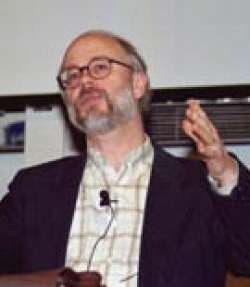Michael Behe

- Born
- 18 January 1952
Michael Behe is an American biochemist, author and advocate of intelligent design. Behe is most famous for his argument for irreducible complexity, which describes that some biochemical structures are too complex to be adequately explained by evolutionary mechanisms and so are probably the result of intelligent design.
Behe grew up in Pennsylvania, and graduated from Drexel University in 1974 with a degree in chemistry. He received his PhD in biochemistry from the University of Pennsylvania, where he researched sickle-cell disease in his dissertation. He undertook a postdoctoral position where he researched the structure of DNA at the National Institute of Health. Behe became the assistant professor of chemistry at Queens College in New York City from 1982 to 1985, and it was here that he met his wife.
Darwin’s Black Box, published in 1996, is one of Behe's most notable works. In it he coins the term 'irreducible complexity' to describe his view on biochemical systems. Irreducible complexity refers to the state where an object or organism cannot have any components taken away and still function in the same manner. As such, the organism has no spare parts; everything is precisely needed.
The conclusion Behe draws from irreversible complexity is that the organ or organism must have been designed as this state could not have been arrived at through evolution. Darwin's Black Box was exceedingly controversial when it was published and many of Behe's claims have since then been refuted.
To a person who does not feel obliged to restrict his search to unintelligent causes, the straightforward conclusion is that many biochemical systems were designed. They were designed not by the laws of nature, not by chance and necessity. Rather, they were planned.
Michael Behe, Molecular Machines: Experimental Support for the Design Inference, 1998
Behe now lectures as a Professor of Biological Sciences at Lehigh University and works Discovery Institute’s Center for Science Culture.



